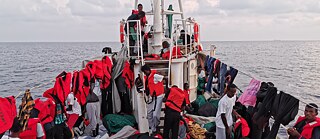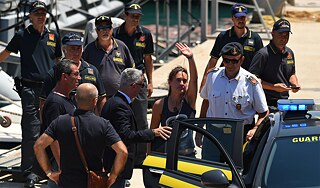Sea rescue
Rights and responsibilities

Every year thousands of people drown in a bid to find the freedom they hope for in Europe. Time and again, those who argue in favour of recusing those in distress at sea are criticised. From a legal standpoint though, what are our responsibilities towards those in trouble at sea?
By Stefan Schocher
Hardly a week goes by without a new report on people drowning trying to reach mainland Europe by sea. And plenty of voices criticise efforts to rescue migrants in distress at sea. Opponents argue it plays into the hands of human smugglers and encourages the flow of refugees. Countries refuse to open their ports to rescue ships, forcing some to sail around aimlessly for days or weeks with severely traumatised people on board. Two Sea Watch captains, Pia Klemp and Carola Rackete, have made headlines in the last few months as their rescue operations were widely publicized. We talked to legal scholar and human rights lawyer Manfred Nowak about the obligations to render assistance to those in distress at sea set out in international law.
There is international law, humanitarian human rights, international maritime law - is there a legal vacuum on the subject of sea rescue?
In my opinion, there is no legal vacuum. The UN Convention on the Law of the Sea stipulates that you have to help those in distress at sea. Anyone who sees someone in need of help at sea is obligated to render assistance. Then there is the state’s obligation to protect human rights by safeguarding lives. This state obligation is not absolute, of course. No state can completely prevent people from drowning or being killed by criminal activity or in traffic accidents. When, however, the Italian state says that ships carrying castaways and the sick are not allowed to dock at Italian ports, it is, in my view, violating its duty to protect the right to life.
So what is the debate based on in pure legal terms?
The governments' argument is that these are not normal castaways. While refugees have the right to seek asylum in another state, migrants do not have the unlimited right to enter another territory. So it is a state’s sovereign right to decide who it accepts as a migrant. Essentially, African migrants coming through Libya are not typical people in distress at sea, opponents argue, since traffickers have deliberately placed them in that position. Furthermore, they assert that Europe is increasingly becoming a destination for irregular migration in part through the encouragement of human traffickers. If non-governmental organisations (NGOs) then rescue the people traffickers have deliberately put in danger at sea, they are in effect facilitating their illegal activities. This is a political argument though; it does not change the legal situation.

Legally nothing has changed and all the same standards still apply. It is just that the state's duty of protection is not absolute; it is relative. The question then become how much can we expect from the state, and how proactive does state have to be. An individual ship has to intervene. But if I don’t send any ships out and make it harder for the ships of NGOs to do rescue work, I am closing my eyes to the problem, but not necessarily violating human rights.
Let’s take Carola Rackete as a concrete example. She defied the Italian authorities' refusal to allow her to dock.
Legally the situation is unequivocal. Carola Rackete violated an Italian legal decree – the directive of the Minister of the Interior to be exact – in an act of civil disobedience. The directive, however, was a clear violation of the protection of the right to life by the Italian government. Rackete ignored an Italian directive, but her actions were covered by international law.
Germany, France, Italy and Malta have now agreed to a joint emergency proposal. Adherence is voluntary though. Is there any legal leverage to demand compliance?
No, there is no legal basis for demanding compliance with this emergency agreement. Repeated attempts have been made. The EU has already decided to implement a distribution key. And although this was a binding decision, the Visegrád states have refused to cooperate. In this case, infringement proceedings could have been initiated before the EU Court of Justice, but this was not done for political reasons. As it now stands, it is a voluntary commitment on the part of the states you mentioned and not a binding agreement.

Since 1999 and the Amsterdam Treaty, the EU has been working on a shared asylum and migration policy because once internal borders have been abolished, protecting external borders can no longer be left to the individual states. Nor, therefore, can asylum and migration policy be left to the individual states. Although various regulations and directives have been issued to harmonise asylum and migration law, the ministers of justice and the interior have ultimately blocked further harmonisation. Fundamentally, the problem can only be solved jointly, ideally through an overarching asylum and migration authority. And how the refugees and migrants are then divided up is a purely internal to the EU and therefore a political issue – which the Visegrád states are blocking. We are at a stalemate, which I hope the new commission will tackle more directly; otherwise they are only kicking the problem down the road.
Sometimes it seems like the EU is its own worst enemy.
No, the EU is not hindering progress here. The EU is a project of European integration with a long timeline that started with economic integration through the creation of a common market and, since the Maastricht Contract and the creation of an EU, is ultimately focused on increasing political integration for a united states of Europe. Unfortunately, there are states within the EU that are growing increasingly politically nationalistic. They are the ones blocking the further integration of the EU, not the EU itself.
What is the legal position of these states that refuse to cooperate?
All EU member states have to follow asylum guidelines and laws – this is EU secondary legislation. Theoretically they could be taken to court for breach of contract. At the moment though, people are trying to solve these sensitive issues at the political level.
Regarding returning migrants to Libya: what is the legal basis for this argument and what are the legal concerns?
If I am aware of how inhumane the conditions in the Libyan camps are, then bringing people back there is a violation of the ban on repatriation. We can accuse a state of inhumane treatment not only if it allows people to be beaten, but also if it returns people to a country in which they are under threat of inhumane treatment. This is absolutely the case in Libya, and the European Court of Justice has ruled repatriating migrants there illegal and a violation of human rights.